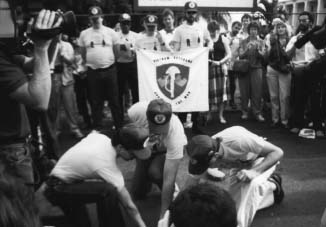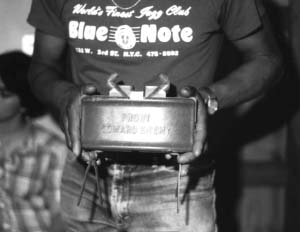 |
Memories of Nicaragua, 1986By Michael GillenOcotal: the name brought back memories last year, and the usual mixed emotions whenever I think or hear of Nicaragua or Vietnam. There's a deep, positive connection, to both those places now (helped by two returns to Vietnam), but the memory of U.S. policy and what it did to them - and those of us who were pawns of that policy - creeps in, and the anger wells back up. In certain ways, the two places go together; memory overlaps and triggers images of one by the other. Ocotal: a place where Sandino and his badly-outnumbered followers fought against U.S. Marines, and napalm had an early use in the late 1920s; where the U.S.-funded Contras did their dirty work in the 1980s. The name came up again, as U.S. troops were sent in by "well-intentioned" U.S. policy to help after Nicaragua was hit hard by storms. I was glad U.S. taxpayers' money was going to help Nicaragua, but was it? What else was going on, really, that we didn't know about? What covert plans for the future were being hatched? The suspicions creep - or rush - back in. But back to Ocotal. We had made our way from Managua on a loop, to Matagalpa, Jinotega and finally Esteli about 80 kilometers due south of Ocotal. We had picked up shrapnel from contra RPGs that hit a government office in La Pererra, and seen wounded soldiers carried into a field hospital in Jinotega. We were in Esteli when the delegation decided to split up temporarily so Arm and I could take a run up to Ocotal for a look-see. We were all set but word came back that it was too hot with contra activity at the time, so that plan was nixed. I remember staying in a hotel in Esteli and bumping into a Spanish Civil War/Lincoln Brigade vet one day, Bill Gandell, who was there on a Spanish language study program. Fifty years after his war, he was still learning the language, and true to his beliefs. For many of us, those guys are what heroism and patriotism is all about: something that extends well beyond the field and often has to do with going up against the system. While in the Esteli area we also toured a civilian hospital that seemed loaded with recent mine blast-related amputees. I remember a small printed sign in Spanish slapped on a wall there that read, in translation, "Yankees, you'll get what you got in Vietnam if you come down here." It was as if that message was placed there for us to take back, which we did. And we brought other things back to underscore the point. Like an account of our meeting with the Citizens Committee in Esteli - all kinds of speeches and expressions of solidarity. But one of the things that Memories of Nicaragua, 1986 stuck in my memory the most was looking into an adjoining room and seeing stacks of AK-47s, stocks to floor and barrels joined, ready to go. It was clear the citizenry was well armed and prepared to do as the Vietnamese had done. The monument to Ho Chi Minh in Managua showed the source of some of their inspiration. The triggering of memories of Vietnam was unavoidable in Nicaragua. Driving past rice paddies could do it. Or seeing a burned out, mine-destroyed civilian bus. Visiting the wounded could certainly do it. Those things began to take their toll, causing flashbacks and nightmares, and the good feelings and excitement upon arrival took a turn that later I better understood as classic signs of PTSD. I saw it in Clarence Fitch, who earlier was so "up" as he presented a chalice from his community to that orphanage, only to have his mood and spirits changed by the end of that week as the images and memories took their toll. Toward the end of the tour it all came together, the memories, lessons, feelings of anger and frustration in the face of the machine, and the need to do what we could to help stem off further misguided policy and bloodshed. We gathered in front of the U.S. embassy in Managua after marching in from the bus chanting, "Reagan, Reagan, he's no good, send him back to Hollywood!" We circled around, and Clarence read the press release he and I had written beforehand explaining our mission and condemning U.S. policy in the region. Then Curmano, Arm and Martinez stuck their fingers with a pin, bent down to touch the ground, and declared, "Let this be the last American blood spilt on Nicaraguan soil."
|


 Our VVAW delegation, three of us from New York and New Jersey (our now-departed brother Clarence Fitch, and Pahios and myself) and nine from the Midwest (Arm, Branson, Curmano, Davis, Lindquist, Martinez, Ramirez, Spicher, and Terry) toured Nicaragua for a week in 1986. This coincided with the 19th - Patriots Day. But there was little to celebrate as we toured hospitals and rehab centers, seeing firsthand the impact of U.S. policy. Word of the U.S. bombing raid on Libya came in that week too. That news only added to a build-up of emotional pain that soon came out in a variety of ways.
Our VVAW delegation, three of us from New York and New Jersey (our now-departed brother Clarence Fitch, and Pahios and myself) and nine from the Midwest (Arm, Branson, Curmano, Davis, Lindquist, Martinez, Ramirez, Spicher, and Terry) toured Nicaragua for a week in 1986. This coincided with the 19th - Patriots Day. But there was little to celebrate as we toured hospitals and rehab centers, seeing firsthand the impact of U.S. policy. Word of the U.S. bombing raid on Libya came in that week too. That news only added to a build-up of emotional pain that soon came out in a variety of ways. Clarence had developed his own sense of history, and the knowledge-based context few of us had at 19 or 20 (21 in my case) when shipping out for Vietnam. This had come to him in part from Dr. Martin Luther King, Jr. I'll never forget the moment when, while making our way past fields and villages in northern Nicaragua one day, we heard King delivering that incredible speech when he came out in opposition to the Vietnam War. Clarence had brought a cassette tape along and slipped it to the mini-van driver. And so, as the scene of another potential Vietnam sped by, we heard King's review of how we got involved in the Vietnam War, and about the spiritual lessons, "the true meaning and value of compassion and nonviolence, when it helps us to see the enemy's point of view, to hear his questions, to know of his assessment of ourselves. For from his view we may indeed see the basic weaknesses of our own condition, and if we are mature, we may learn and grow and profit from the wisdom of the brothers who are called the opposition."
Clarence had developed his own sense of history, and the knowledge-based context few of us had at 19 or 20 (21 in my case) when shipping out for Vietnam. This had come to him in part from Dr. Martin Luther King, Jr. I'll never forget the moment when, while making our way past fields and villages in northern Nicaragua one day, we heard King delivering that incredible speech when he came out in opposition to the Vietnam War. Clarence had brought a cassette tape along and slipped it to the mini-van driver. And so, as the scene of another potential Vietnam sped by, we heard King's review of how we got involved in the Vietnam War, and about the spiritual lessons, "the true meaning and value of compassion and nonviolence, when it helps us to see the enemy's point of view, to hear his questions, to know of his assessment of ourselves. For from his view we may indeed see the basic weaknesses of our own condition, and if we are mature, we may learn and grow and profit from the wisdom of the brothers who are called the opposition."